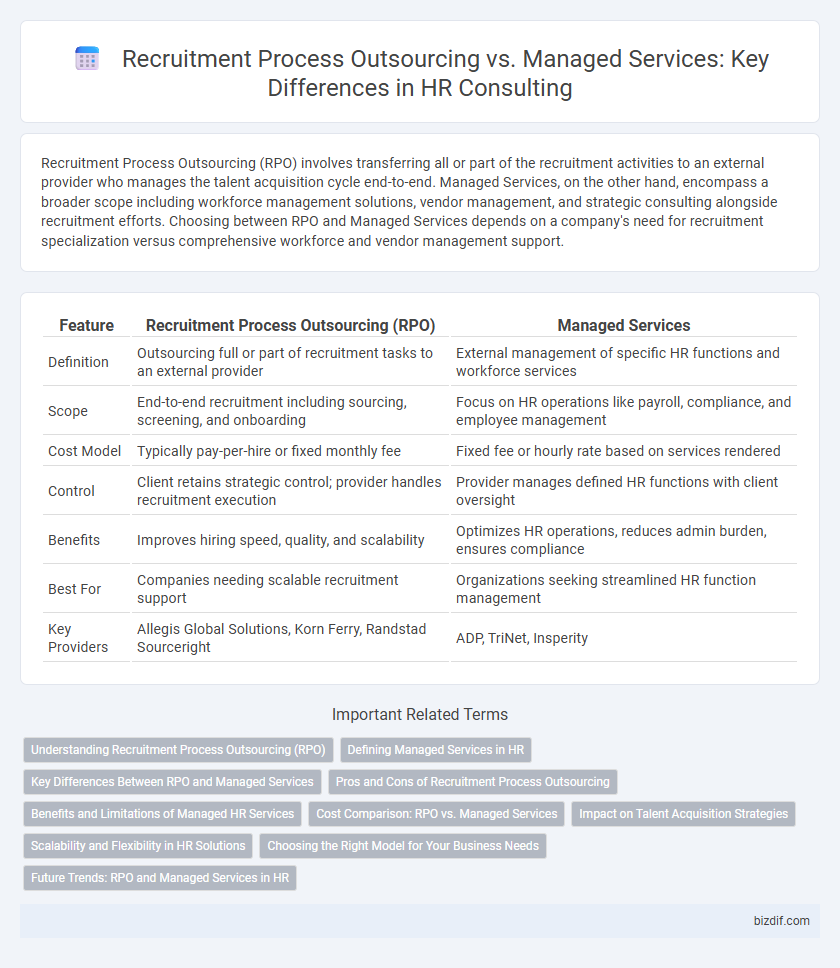Recruitment Process Outsourcing (RPO) involves transferring all or part of the recruitment activities to an external provider who manages the talent acquisition cycle end-to-end. Managed Services, on the other hand, encompass a broader scope including workforce management solutions, vendor management, and strategic consulting alongside recruitment efforts. Choosing between RPO and Managed Services depends on a company's need for recruitment specialization versus comprehensive workforce and vendor management support.
Table of Comparison
| Feature | Recruitment Process Outsourcing (RPO) | Managed Services |
|---|---|---|
| Definition | Outsourcing full or part of recruitment tasks to an external provider | External management of specific HR functions and workforce services |
| Scope | End-to-end recruitment including sourcing, screening, and onboarding | Focus on HR operations like payroll, compliance, and employee management |
| Cost Model | Typically pay-per-hire or fixed monthly fee | Fixed fee or hourly rate based on services rendered |
| Control | Client retains strategic control; provider handles recruitment execution | Provider manages defined HR functions with client oversight |
| Benefits | Improves hiring speed, quality, and scalability | Optimizes HR operations, reduces admin burden, ensures compliance |
| Best For | Companies needing scalable recruitment support | Organizations seeking streamlined HR function management |
| Key Providers | Allegis Global Solutions, Korn Ferry, Randstad Sourceright | ADP, TriNet, Insperity |
Understanding Recruitment Process Outsourcing (RPO)
Recruitment Process Outsourcing (RPO) involves transferring all or part of the recruitment activities to an external provider who manages and optimizes the hiring process using advanced technologies and industry best practices. RPO providers deliver scalable talent acquisition solutions, improve candidate quality, and reduce time-to-hire by integrating with the client's HR systems and recruitment teams. This approach allows organizations to focus on core business functions while benefiting from streamlined recruitment strategies and cost efficiency.
Defining Managed Services in HR
Managed Services in HR involve outsourcing specific HR functions such as payroll administration, benefits management, and compliance monitoring to a third-party provider. This approach ensures streamlined operations and enhanced efficiency by leveraging specialized expertise and technology solutions. Unlike Recruitment Process Outsourcing (RPO), which focuses primarily on talent acquisition, Managed Services provide comprehensive support across multiple HR domains.
Key Differences Between RPO and Managed Services
Recruitment Process Outsourcing (RPO) involves transferring the entire recruitment function to an external provider, who manages everything from sourcing to onboarding, ensuring scalability and expertise tailored to the client's hiring needs. Managed Services, by contrast, focus on managing specific segments of the talent acquisition process, such as vendor management or recruitment technology, enhancing efficiency and cost control without fully outsourcing recruitment. Key differences include the scope of responsibility, with RPO offering end-to-end hiring solutions and Managed Services providing targeted operational support within the recruitment cycle.
Pros and Cons of Recruitment Process Outsourcing
Recruitment Process Outsourcing (RPO) offers HR consulting clients access to scalable talent acquisition expertise, reducing hiring time and improving candidate quality through specialized recruitment teams. However, RPO can lead to less internal control over recruitment strategies and potential cultural misalignment if the external provider lacks industry-specific knowledge. While cost-effective for high-volume hiring, smaller organizations might find RPO fees restrictive compared to in-house or managed service alternatives.
Benefits and Limitations of Managed HR Services
Managed HR services provide comprehensive support by handling recruitment, payroll, compliance, and employee relations, enabling organizations to focus on core business activities. Benefits include cost efficiency, improved compliance through expert oversight, and scalability to adapt to changing workforce needs. Limitations involve potential loss of direct control over HR functions and challenges in maintaining company culture due to external service provider involvement.
Cost Comparison: RPO vs. Managed Services
Recruitment Process Outsourcing (RPO) typically offers lower overall costs by streamlining recruitment through specialized providers who manage the entire hiring cycle, reducing internal administrative expenses. Managed services, while often more flexible, can incur higher costs due to ongoing vendor management and varied service scope, especially for organizations with fluctuating hiring needs. Organizations should analyze their recruitment volume and complexity to determine which model delivers optimal cost efficiency.
Impact on Talent Acquisition Strategies
Recruitment Process Outsourcing (RPO) centralizes candidate sourcing, screening, and onboarding, enabling scalable talent acquisition strategies that align with organizational goals. Managed Services enhance talent acquisition by integrating technology and analytics, optimizing recruitment workflows to improve efficiency and candidate quality. Both models impact talent strategies by providing flexibility and expertise, but RPO focuses more on ownership of recruitment processes while Managed Services emphasize continuous optimization through data-driven insights.
Scalability and Flexibility in HR Solutions
Recruitment Process Outsourcing (RPO) offers scalable hiring solutions that adjust quickly to fluctuating workforce demands, ensuring efficient talent acquisition during peak periods. Managed Services provide flexible, end-to-end HR support by integrating recruitment with other HR functions like payroll and compliance, enabling seamless adaptation to organizational changes. Both models enhance scalability and flexibility, but RPO focuses primarily on recruitment volume while Managed Services deliver broader HR operational agility.
Choosing the Right Model for Your Business Needs
Recruitment Process Outsourcing (RPO) provides end-to-end recruitment solutions, enabling businesses to outsource the entire hiring process to specialized providers, which improves scalability and reduces time-to-fill for critical roles. Managed Services, on the other hand, focus on managing specific recruitment functions or contingent workforce management, offering flexibility and control over talent acquisition budgets. Evaluating factors such as hiring volume, internal HR capabilities, and cost structure is essential to selecting the model that best aligns with your company's strategic workforce goals and operational needs.
Future Trends: RPO and Managed Services in HR
Recruitment Process Outsourcing (RPO) and Managed Services in HR are evolving with increased adoption of AI-driven analytics and automation to enhance candidate sourcing and employee engagement. Future trends indicate a shift towards hybrid models combining RPO's scalability with managed services' strategic workforce planning for improved talent acquisition efficiency. Integration of predictive analytics and real-time labor market data is transforming these HR solutions, enabling proactive talent management and reducing time-to-hire.
Recruitment process outsourcing vs managed services Infographic

 bizdif.com
bizdif.com